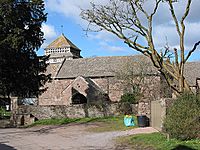St Bridget's Church, Skenfrith facts for kids
Quick facts for kids Church of St Bridget, Skenfrith |
|
|---|---|
| Church of St Bridget | |

"an important medieval church"
|
|
| Lua error in Module:Location_map at line 420: attempt to index field 'wikibase' (a nil value). | |
| OS grid reference | SO456203 |
| Location | Skenfrith, Monmouthshire |
| Country | Wales |
| Denomination | Church in Wales |
| History | |
| Status | parish church |
| Founded | c.13th century |
| Architecture | |
| Functional status | Active |
| Heritage designation | Grade I |
| Designated | 19 November 1953 |
| Architectural type | Church |
| Style | Early English |
| Administration | |
| Parish | Skenfrith |
| Deanery | Abergavenny |
| Archdeaconry | Monmouth |
| Diocese | Monmouth |
The Church of St Bridget (also known as St Bride) is located in the village of Skenfrith, Monmouthshire, Wales. It is an active church that serves the local community. This church is a very important old building, officially recognized as a Grade I listed building. It is named after Saint Brigit, a famous saint. In the Welsh language, her name is Sant Ffraid. Many churches across Wales are dedicated to her.
History of the Church
This church is very old, built during the Middle Ages. The oldest parts of the building are thought to be from the time of King John, who ruled between 1166 and 1216. The church was made bigger in the 1300s and again in the 1500s. It was carefully repaired in 1896 and then again in 1909–1910. The church is still dedicated to Saint Bridget.
Church services are held here every Sunday morning at 9:15.
Design and Features
The Church of St Bridget is built from a type of stone called Old Red Sandstone. It has a main area called a nave with two aisles, a chancel (the area around the altar), and a tall tower at the west end. The tower has a special top that looks like a dovecote (a home for doves) and a pointed roof.
Inside the church, you can see a beautiful stone tomb. This tomb belongs to John Morgan, who passed away in 1557. He was an important person who served in the Parliament for the Monmouth area. He also managed lands for the Duchy of Lancaster and was the last governor of three nearby castles: Skenfrith, Grosmont, and White Castle.
There is also a special stand for reading, called a lectern, made in 1909. It was designed by George Jack, who was part of the Arts and Crafts Movement. This movement focused on making beautiful, handcrafted items. The lectern has a figure of Saint Bridget carved into it.
The church is considered a Grade I listed building. This means it is one of the most important historic buildings in the country. Its official description calls St Bridget's "an important medieval church with an exceptionally good interior."
 | Kyle Baker |
 | Joseph Yoakum |
 | Laura Wheeler Waring |
 | Henry Ossawa Tanner |

